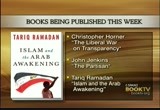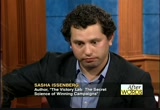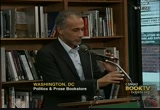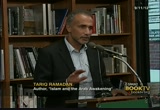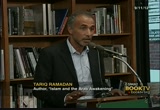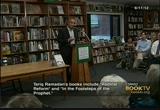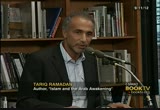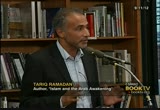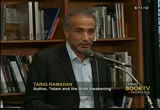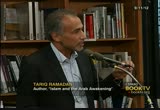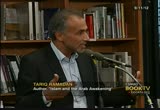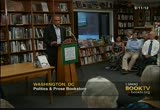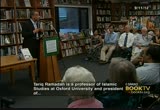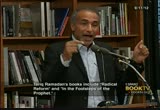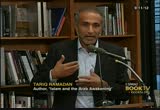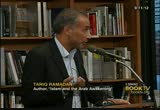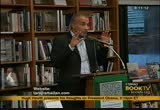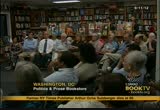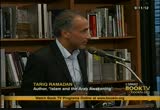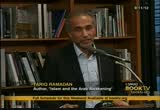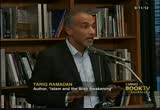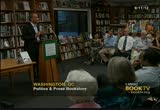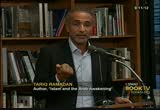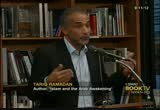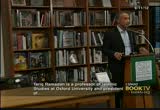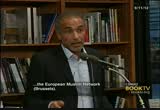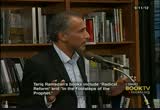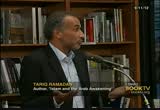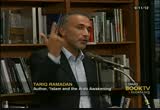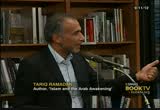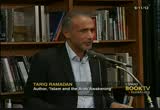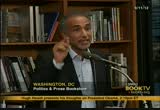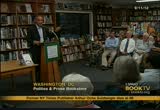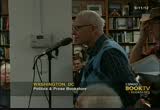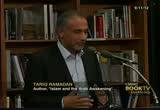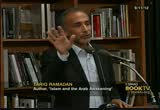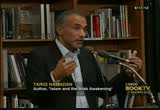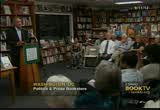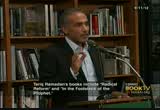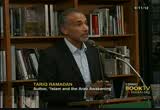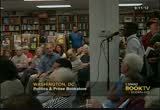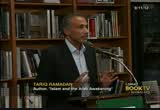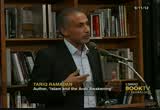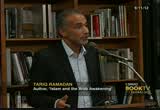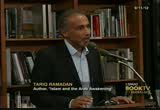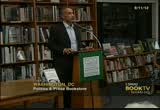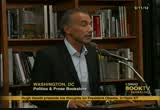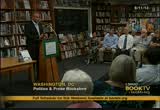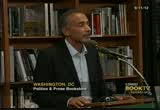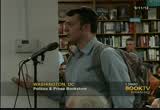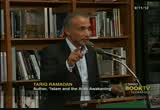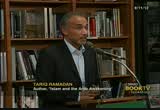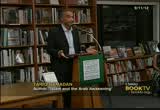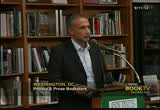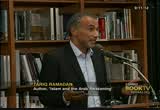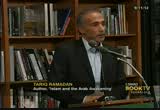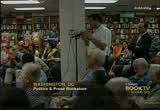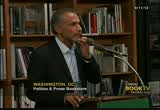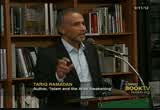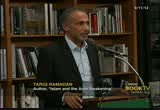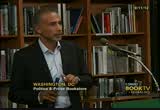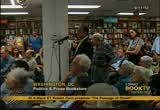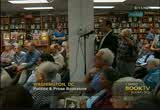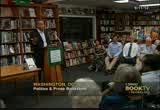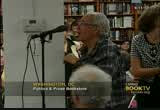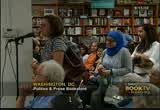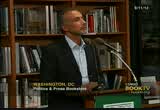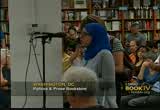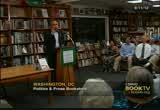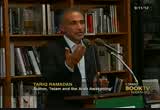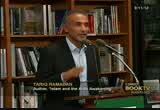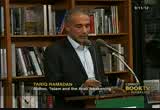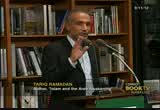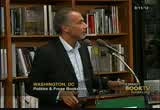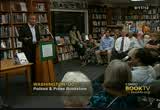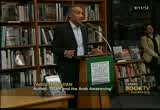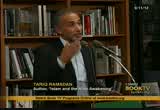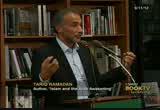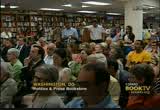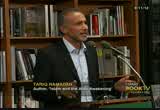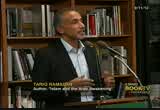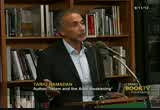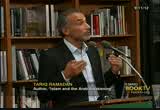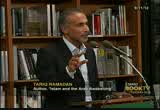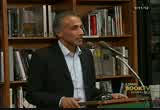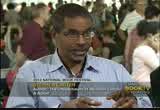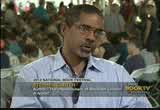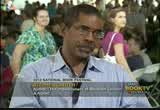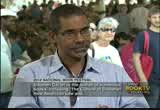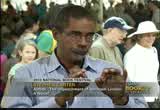tv Book TV CSPAN September 29, 2012 12:45pm-2:15pm EDT
12:45 pm
the future role for the country's involved. you can watch a presentation from this offer on booktv.org. watch for the authors in the near future on booktv and on booktv.org. >> i was always shocked as anybody who spent time around campaigns that -- explain to me why they did everything they were doing. how do you know that? why do you do that? at some point they do it that way or they did it because they had a set of rules that wasn't based on any research. i went around with skepticism about a lot of practices that breathtaking place and the way people expending money. as i learned about people starving and academia doing field experiments and randomized control files being adopted by people in the political world
12:46 pm
and innovations and data and targeting and revolutionize campaigns. this was a major generational shift. the way campaigns operate is cultural tension between a lot of old practices the way they operated and new empirical movement. >> more with victory lap of her sasha issinghburg at 9:00 eastern and pacific on c-span2. tariq ramadan, president of the european muslim network talk about the causes behind the arabs spring and the role he thinks islam will play in the future of the countries involved. this is just under an hour. >> thank you.
12:47 pm
can you hear me? can you hear me? okay. thank you so much for the invitation here and for being here with us this evening talking about specific topic and complicated issue when it comes to try to understand what is happening in the middle east and african countries and what is the way forward because it is not only about understanding what happened but also the challenges when it comes to democratization in the middle east and the future. having said that, this very date when we were thinking of what was happening in this country once again after said cumberland but even much before but after september 11th we had the perception connecting islam to violence and terrorism and
12:48 pm
violent extremism. the right time to speak about a tiny minority of these killings, massive demonstrations of people in egypt and tunisia and syria asking for justice and freedom. these are muslims. the right answer to talk about millions as the response to the tiny minority of people who are not representing islam for the majority of islam's around the world. it is an answer we have to get. when i started writing the book i was trying to to get a sense of what was happening and i started to deal with the fact, was it true that what happened in to nietzsche -- we do know
12:49 pm
anything about what was happening in tunisia and egypt and we were caught by surprise. by studying the fact this is not the real picture of the process. years before -- we didn't take seriously what president bush was saying in 2003 when he was saying we want democracy in the middle east. he said that when he was talking about iraq but he meant it and we didn't really listen to. reducing his statements or the perception we have of him, for getting he is representing a system. he is representing an administration. this administration pushing for many reasons and not only political reasons anything which has to do today with the democratization in the region. the bloggers and cyberdissidents
12:50 pm
who were pushing and spreading around of feeling that something should change in egypt and tunisia and even syria or yemen many of these blockers -- this was known. google, freedom house, they were training people and financing the training of people who were advocating democracy and liberating the countries and they were trained by american organizations and european organizations and if we study what happened in eastern europe with the whole process of the european spring, eastern european spring because behind it was a philosophy no one had heard and not enough people heard about sasha pop povich who was getting a sense of how we
12:51 pm
mobilize the people in order to push for a massive demonstrations in the country. the fact that this was not known is strong. on the other side it was organized in groups as wrong as well. very far from the conspiracy theory. i don't want to be naive. it came from the people, western governments who were happy to see the people being democrats in egypt and supporting dictators themselves. what they did was egypt and so many dictators. they were supporting them because it suited the strategy. the point for me was to deal with this and be cautious with words. i was not buying from the beginning of this perception that the arabs spring, revolution. i started by saying let us be cautiously optimistic.
12:52 pm
something is happening which is great. this is what i call in the book and in the title the awakening. the awakening of the arab mind. the intellectual revolution with people understanding it is possible to get rid of dictators and change a country. this is fear reversible. and something which is a legacy of the personal a shift which is very promising for now and the future. to speak about revolutions that are achieved, i don't know. i don't know today if what is happening in egypt is an unfinished or achieved revolution. i don't know what is happening with what is happening in tunisia that we can be very quick in defining. revolutions take time. we have to be cautious and understand many dimensions have
12:53 pm
to be considered. i am not only political. the political apparatus, political dimension is making us forget the economy factors. there would be no democracy in the region if we don't have economic stability. to open up countries or open the market is something we know in africa. happened before. to deal with the arab world as we are very happy these people are for justice and we don't care which kind of political and economic policy for new positioning we get in the global economy which is very naive and we have to be cautious with this. we were dealing with this, something which is not as easy
12:54 pm
as this. it is if i have to talk about an intellectual revolution that is changing and we have to cope with this and hope the new generation are going to start from there. this is the beginning of the book and also saying hosni mubarak didn't know what was happening that -- many people were arrested because they were in the west and they were arrested. they knew something was happening. the american ambassador sent a note to the american government saying there are young people who want to get to the hosni mubarak regime before september of 2011 so this was in 2008. three years before. we were not aware of what was
12:55 pm
happening but so many analysts dealing with the issue were saying egypt is going to implode because the economic situation the personal corruption, unemployment, poverty. they were there in tunisia. we have to look at the whole dimension with more critical take on what was said and the way it was covered by the media. the second thing i am trying to analyze is the discussion and the way we are looking and we are still looking at arab countries and muslim countries. as i was analyzing and trying to get a sense of the debates there's something we still have now and what we have now is a discussion about the debate. we reduce everything in the arab
12:56 pm
world between the secularists and the islamists. if you want to understand the political landscape you have progressive secularists and backward islamists. it is not only coming from the west. when i visited tunisia and when i was dealing with people in algeria or in egypt we had this polarization and the polarization is coming from a perception but something that is happening from within in the arab world itself and this is a problem because at the end of the day the polarization is not only misleading but making the political debate very superficial. you end up talking to secularists and they explain or justify their political presence by saying we are progressive. we have universal values and these people are backward reactionary religious people who want to impose a theocracy.
12:57 pm
so there justification about their political presence is we are against them. it is the justification by the opposition. you go to the islamists and they have the same position. we are the guardian of the islamic tradition and these people are westernized. they come with ideas of the west and we are resisting the influence. we have people justifying their political presence through opposition to islamists and islamists being the guardian of religion justifying the presence and political will by resisting western as asian and that is it. what is your answer to the problems we have within the society? what is your social policy? what is your educational policy? we don't have answers. the only thing is polarization is reducing political discourse
12:58 pm
into something that is simplistic to. not only the arab world is falling into that trap but we in the west read this situation to these lengths and egypt is in danger. too many men are wearing head scarves now. the symbol is dynamic and you can laugh but i am sorry to tell you the media coverage is too often the case that we are reducing the reality of a country on symbols. how many women and how many men. what is your position on sharia, if you use the term is over. that is the reality of the simplistic discussion we have. but once again what i am saying to the muslim countries in the arab world you cannot blame the west to reduce the political discourse. this is what is happening in the
12:59 pm
muslim countries themselves. this is the problem. by going beyond us, polarization is there and we have to move beyond us and we have to face -- this is the second part of the book. what i am trying to tackle, way forward. the critical questions that we have. we have five main areas where we have to deal with critical questions and they are not simple. remember ten years ago in turkey many people were saying he is an islamist and will impose sharia. after ten years no one is talking about imposing or implementing cheri at in turkey because he says i am a muslim. i am a democrat. i am a muslim democrat as much as you're having people being questioned and democrats. it is not a contradiction in terms. now we acknowledge that what is
1:00 pm
happening in turkey is not a contradiction in terms because he is respecting the secular system and working from within and saying i'm a democrat with islamic preference and at the same time trying to promote rule of law within the country to work against corruption and transparency and respecting the constitution and the laws that were implemented and being very successful on the economic side. no one today is talking about islamists implementing cheri. ..
1:01 pm
>> what we face in the west now, we know this as citizens. i live in euro, you live in the united states of america, and we know the problem with the democracies now is not the dogmatic decisions of religions, but some decisions of frans national cooperation and economy power deciding without being able to say anything and we cull it democracy, still today dealing with power that are beyond the procedure. the banks, transnational cooperation, and, for example, in greece, in spain, in italy, we have those coming to solve the problem we never elected
1:02 pm
them, but money is choosing them. we have to deal with not simplistic answer when it comes to separate religion from states, what do you have? directing the state or imposing decision on to the state which is also imposing decision on to us as citizens. this western model, i think, be washington. we all have to deal with problems and crisis from within. i wouldn't push the arab world to follow blindly the western model, but take the better, the best from the others and try their own way. having said that, the first problem is the nature of the state. why -- i was referring to this dpsh voided referring to islamic states, and if you listen now to
1:03 pm
what is coming from tunisia and what is coming from egypt they don't speak about islamic state. it's a civil state, and the civil state means that religion is now going to impose a frabbing work and structure. having said that, that's fine. are we playing with words or are we really now talking about how much the state is a bottom up delegation of power and religion and it has no power on the decision on the states. what is coming from the new islamists and even, you know some say it's no longer islamist, but part islamist. i don't know when islamist started now. i don't know when it's ending, but we are -- we have some, you know, problems here with terminology. the point is they refer to
1:04 pm
islam, threne -- and there are critical questions to ask with the prerogatives of the state in which we are dealing with the principle, and my point here is to say the muslim countries should be on six main principles that for me are not negotiateble. the first is rule of law and second is equal rule of law for all citizens, muslims, people of other faiths, or no faith at all. it's important. the third one is universal suffrage, a majority process. when you are elected, you are elected for awhile, but have to be checked by the citizens, not to be democracy electly for life as we had with the family. this is what we had with before. this is authority, and
1:05 pm
differentiating the states from religion when it comes to. it's not that you're separating, but divorcing, and in the united states of america, you know that the separation is not exactly the same as the european secular systems. for example, the -- when you talk about this in france, there's a lot saying we are the only secular society. the way you have, you know, you can't, in france, say god bless fraps. you can't say that. that's -- that's mixing -- confusing everything. even though you can't think about it, you can't stay it. the point is that the relationship is important. in countries, the separation could be separating without divorcing, and what i mean by divorcing is to have an ethical reference. i'm very serious about this by
1:06 pm
saying atheists are religious people, christians, jews, muslims, or buddhists. i'd like from our philosophy or religious traditions to put more ethics in politics. it's not imposing religion, but having a reference in ethics. ethics, you know, it's a separate religion from power doesn't mean you don't have ethics in politics. what could be a reference, it's a very deep discussion, and especially when it comes to muslim majority countries, we have limits with freedom of expression, art, and, you know, all of the discussion that we have now in tunisia. this is one -- good on time, i think -- and so this is about the state, very important discussion that we need to have, and we have now the islamist groups and secularists, they are not clear on this because i was facing tom seculars, always
1:07 pm
justifying the position by being against islamist. okay. it's not because you are religiously liberal that you are politically democrat. some were supporting dictators for years, some, selling to the west, we are progressive, against the imposition, but they were supporting some of them, not all of them because some of them were resisting so we have to be very cautious. it's not because you are religiously liberal that it means you support what i was mentioning nowment i think on this we have to get answers from all the political actors in muslim majority countries. the second is very important one about the economy vision for the future because if you look at the islamists today, they are accepting the free market and
1:08 pm
neomarket. they are now making better, you know, when the eu didn't want him or turkey, okay, you'll see, might be now that eu is much more in need of turkey than turkey as you see it. it's a very important point. why? because he's doing well in the economic side. is this the answer? is this the answer? do we want the market to be open and this is why we immediate by democracyization or do we want economic stability? my point here is that the first steps to go to the imf to do the world bank and to enter within the system would could be a pron the future, and we know that islamists are not a problem with the west as long as they are neoliberal and capitalists. we know this. there's an example, and i keep on repeating this and have been repeating this because it was said i was banned from the states, and then it was moved that i'm still banned from saudi
1:09 pm
arabia for the criticisms that i'm making to a country which is a lie of the united states of america. it's not a democracy. no one care about the status of women in saudi arabia because they are protecting our economic interests. you can be a conservative there. you can ban women from driving car as long as you protect our oil and economy interests. at the end of the day, there are limits. they are saying there is no democracy in islam, but they are the right to take on the economy. we have to be serious about this. at the end of the day, what comes from the islamists now is they are not resisting economic power. they are not resisting the transnational cooperation, but they are ready for it. it might be this is the point here that because they are ready we can deal with them.
1:10 pm
there is another thing important on the economic side. this is what i'm saying. if we keep on talking about the political structure and not about the economic challenges, we are misled into whole discussion. my take on this is what it happens in the middle east is not for political reasons. i don't think -- sorry, the obama administration or the european administrations are more happy with the democracy than they were with dictators as, you know, i think it's a question of interest. what are the interests now? over the last ten years, the chinese economy present in the middle east was multiplied by seven. it's a very powerful presence, and the greek countries brazil, india, china, russia, south africa, turkey, indonesia, are playing a very important role in the region, and we don't talk about this, but it's -- there is
1:11 pm
a shift here, and for many reasons, it has -- it's going to have an impact. on the countries on the relationship between israel and other arab countries because remember china has not the same relationship to israel than the united states of america. this is a very big concern. what is going to happen in the region? we have to take these seriously. it's not just political, but economic and this is a second point which is the answer. the economic vision coming from the arab world, when i was talking to the current president in tunisia, i was with him recently, and say i don't have a problem to deal with islamists as long as they deal with the rule of low and democracy, transparency, all of this is fine. my main problem with them is not the fact they refer to islam. my problem with them is that their take on the liberal economic system. they are ready for that. this is my problem. these are secular minds, but he has a problem with the islamists
1:12 pm
because they are very, very conservative on religious terms and very liberal on economic terms. it's the same with the muslim brotherhood, as you know, recently dealing with the world bank and imf. second, thing -- third thing, that's about education. very quickly. this is where we need to have a very deep discussion. there will be no democracy, no change if we don't work on education. i mean by education for all, education means also to struggle against poverty, and jihad for education, which is something which is essential. this is what i'm saying about women. you know, i was talking about, you know, head scarf industries, but i'm sorry, the only way you evalwait and assess empowerment of women in muslim country is on two things, nothing to do with the way they dress. it has to do with access to education and access to the job markets. this is why we want the people to be, and the secular are not
1:13 pm
coming with answers, and the islamists are not coming with answers that are credible and efficient. this is a big question. what is your educational policy in which we are going to invest? and reassess religions, the teaching of religion in the society, and on this, it's going to be a big problem. we have two challenges on this field. the divisions from within the literalists and the reformists and the sufi and rationalists, divisions from within, and the big divide between shia and sunni is a challenge. the fourth one is about cultural, and i think that arabs and muslims are not taking this seriously. we are facing the world culture that is very much penetrating every sector within the society. if you look at the arab world, we have a problem. the arabic language, arab
1:14 pm
literature, the books, it's the creativity, where are the arabs when it comes to movies, art, entertainment, when it comes to democracy, it's not about rules only and rights, but about feeling good, being creative, producing something that's is of our perception of the world? where is it? who is promoting this? it's a challenge. we have to talk about art. we have to talk about beauty. it's part of the democracy thing. it has to do with freedom. it has to do with a sense of belonging within the society, and i think that it's neglected in our discussion, and the last one, which is a theme coming out of all of this process is covering the whole thing, the way we deal with corruption because it's the starting point and end of the whole process. it is one of the main challenges in the arab world at all levels by the way, because ordinary citizens say the people are so
1:15 pm
corrupt, but, today, daily corruption experienced in the arab world is something we all know. we have to deal with this, and it is ethics of civil society and citizenship. this is the way i would say islam plays a role as being an ethical reference, not by clothing and being the frame work where we can't adjust, think, but being reference where principles and objectives hope the people to do something which is is the future. celebrate the principles, the six that i mentioned. celebrate the shift, the mind set, the revolution, and saying one thing which is important, and at the end of the day, we are promoting shared universal principles, but it's not about us deciding for the people which democratic models they will have in the future.
1:16 pm
this is their business. for the egyptian to fight the political model that is referring to their history, clerkive psychology and model, it's not for us to go to iraq and say this is the only right model that you need because we know how it should be. this is imperialist, this is colonization, let the people find the models and let us be part of the discussion. this is why i'm in europe as well sharing this with you. all of us here as citizens have a role to play. by being critical about our own experience as democrats and as citizens, by seeing in our society the failures, the underminding process of us being citizens and seeing people deciding for us, saying we have to be critical, and at the same time to be very clear on anyone who is not advocating violence,
1:17 pm
but advocating freedom, dignity, and equal rights had the right to be part of the political discussion in the arab world. it's not for us to say you are the good democrat or the good muslim or the bad muslim. this is once again not going to help nip in the future. thank you. [applause] >> enjoyed your talk very much. what i'd like you to do is talk more about bringing women into the running of things because it seems to me that most of religions, for instance, have male idols in the leader role, and it was not until, you know,
1:18 pm
1920 that women got to vote in this country. if you don't let them in, they just don't seem to have much influence, but if you do let them in, you get a different vision than from the males. the males got a load of testosterone, and it's bind all the wars we've had. it's behind the trowels -- troubles we've had, the crime and stuff, and so if you put women in, you'll get a different view point. i'd like you to comment on that. >> i completely agree with your conclusion. i would be more cautious about the bilogical explanations. [laughter] but the serious point here is really about women being much more involved, and i completely agree with this. you know, we have to be serious about this, and we have to rely on facts and figures when it
1:19 pm
comes to when a society is doing well. if you look at all of the facts and figures when it comes to education and when it comes, for example, to agriculture, when it comes to every dimension of being efficient, when you allow the women to be involved, doing better than men, the facts are here. it's in agriculture, it's in education. not only in muslim countries, not only in the global south, but look what's happening in the west. we have now women and muslim women being involved in education at the same level as men. those figures are clear. they are doing better than men. this is creating even problems within the muslim communities in the west because now they are more educated and more efficient. i would say that having -- and starting with this as a principle, it's very important to try to find a way to promote women, and i would say don't be misled by the vision of what is happening in the muslim
1:20 pm
countries. the uprisings, women there very much strurmtal. -- instrumental. they were there, even in saudi arabia, women very much educated and being more and more visible. the point is to promote this visibility to education and job opportunities and to get them not as symbols. be careful with symbols that betray the reality on the ground. this is where we have to come together. what i would like from us in the west is not to say the only liberated women are the women who are like us. no. the liberated women are liberated women when they think, when they are empowered and they can be practices muslims and liberated women. we have to reassess our perception of who is free and how they are free. having started by this and this, we try to -- to have a critical
1:21 pm
discussion and promote the rights of women, but i completely agree this should be done, and it also should be done in the way we deal with the religious script sources. in the book "radical reform," i allocated a chapter on women. we have two problems, reduction to the text of the literal understanding and projection of cultural on the text. the cultural understanding, we have to deal with this. it's a critical challenge that we have here. >> i just spent 90 minutes before you got here checking out various things in your book in the index. page 81, 131, you seem to say there's no way that democracy can take root in the middle east unless the palestinian problem is solved. my question is does that mean it will be israel's fault is democracy fails in the various countries? [laughter] >> it's good with your question. i always agree with the first part and not with the
1:22 pm
conclusion. [laughter] i said that. let me put it clearly. very often the arabs and in the middle east, they are explaning all of the problems that they have in the middle east by saying, you know what? israel is the reason so you come to the conflict, all problems come from israel. i'm saying the opposite. i say israel and the problem we have with our lack of support towards the palestinians is a consequence of many other problems. it's a consequence. the causes of all of this is that if you are serious about democracy process, we all -- what i just mentioned, all the challenges are there, but i'm not naive. by saying remember what israel said when the people were demonstrating in the tahir square saying we have to support mubarak. there is a problem here, which
1:23 pm
is everything that has to do with transparent democracy in the arab world will mean the end. the great majority of the people are not going to be happy with israel policy. with the palestinians, and the israeli government, they know that. if you want to deal with democracy in the middle east, you better reassess israel's policy towards the palestinians, and this has to be solved because not -- i'm not saying it's the cause. i'm saying it's the critical discussion that we have in the middle east, and what is happening in syria, what is happening in many countries around has to do with the palestinian issue so at the end of the day, the point here is to say that israel, and i said it many times, it is one of the causes why by stopping this yiewn --
1:24 pm
unilaterally because they are not doing a service to respect of people in the region. this is is my point. i repeat this, and i'm not trying to say that israel is to be blamed for this, but if we want to go to achieve something that has to do with transparent democracy in the middle east, we have to solve the conflict in a way that respects the rights and dignity of the palestinians. >> sounds like double talk. [applause] >> no, i'm sorry you end like that. you know my answer to the all the people say that i have double talk? i'm just responding you might have a double hearing. [applause]
1:25 pm
my question pertains to syria. how do you characterize the ongoing conflict there? recent news reports characterized it as an emerging secretary conflict. do you think that it is a conflict definedded primarily in opposition to the government of president assad or do you believe it's an emerging sectarian conflict in the region? >> look, when i was writing, you know, on my website, i was trying to write every week, an article of what was happening. for eight months, the u.s. administration and the west was not supporting a change in syria. you remember that for eight months they asked assad to reform his regime from within. this was coming from european countries and coming from the state. at one point it was clear that
1:26 pm
the massive demonstrations were not to be controlled so something had to be done because the people are not happy with him. then it changed and then they had to deal with who can we trust in the opposition. in the opposition, we have islamists and we have some very much against the american administration. they took eight months to start dealing with the opposition and tried to find people that they can trust. the russian government and the chinese government, they didn't li what was done in libya where after the non-flight zone, this was used to enter and they were completely dismissed and just nowhere in the libyan picture because it's divided between the states, qatar, the united kingdom, and france. the starting point is really about politics and geostrategy. what happened afterwards is that all the reading of this
1:27 pm
political challenges where we were in sectarian mode by saying, and, you know, in my website and even when i wrote the book, i got so many criticisms insults coming from muslims saying in fact, you support the resistance because you are sunni and you like the qatari-saudi monarchy, and from the other side, the people from the shia tradition saying we support assad because he's a supporter of, you know, palestinians and at the same time the shia tradition, and it became something which is sectarian reading of the whole thing. i think it's very dangerous. i -- i allocated one section in the book about this divide between shia and sunni saying it's one of the great challenges of our coming years because i don't see enough scholars.
1:28 pm
i don't see enough intellectuals. i don't see enough public figures and people being ready to say shia and sunni, we are muslims all together, and we have to stick to some principles. it's not because he's supporting shia that we can't support the dictator so assad is a dictator, and just based on principles, we have to get rid of dictatorship, and he has to be removed and to find a way in syria. i would say exactly the same in bahrain. all of the people who sell what was done in bahrain saying you know what? they are shia against sunni. we have to accept what is happening. i'm sorry, that's not right. that's -- it's not because the people are shouting that it's right for sunni to o proses them. we have to -- oppress them. we have to come to shared
1:29 pm
principles, but not playing with religious divisions that is now happening in the middle east and it's going to have a very important role between lebanon, syria, iran and all of the other countries in the mop ark kyes, and some monarchies are playing a very, very nasty role in the whole thing. in saudi arabia, qatar, they are playing with this now, and you have -- some scholars are playing with this, and i'm sorry, i think that we have to be courageous to say that's not acceptable. that's not acceptable. we have to stick to principles against the dictators, whoever they are, and for freedom for whoever are the people. >> there's protection of minority rights, and given the principles, why should we have
1:30 pm
optimism whatsoever about the creation of democracy in muslim majority countries where god is sorch -- sovereign and where the countries have a history of oppression of religious minorities for centuries and where that oppression is evidence today is in a list of countries, saudi arabia, iran, i egypt, iraq. that's enough, yes. >> i think we have to be very cautious not to take example in history as defining a religion or civilization because if i was to do this, the american civilization, i wouldn't trust it. if i was to do this -- [applause] no, no, it's not a political -- no -- >> [inaudible] >> no, no.
1:31 pm
>> i'd be delighted to debate history of religious liberty opposed to those in the countries that i listed. please compare them, and you'll see a tremendous difference. >> can i answer? just ask the native americans about the way they were treated, but that's not the point. that's not the point. the point is we have to be intellectually fair and e quipped when it comes to dealing with history, and not reduce history to what happened and what we can see now because in the arab world for centuries, the jews and the christians were much more respected than they were in europe. if you are serious about history, just look at the middle regions where europeans had to learn, but the point is why should we trust now the arabs? i'm not asking you to trust. i'm asking you to be objective and to check, and to check what
1:32 pm
could be done, and if you now decide that the arabs because they are muslims, they are not going to respect minorities, that's over, just send them dictators, but if now you get it, that from within this islamic tradition, you have a very long tradition of dealing with diversity, respecting people, and opening up, if you think this is possible, i'm not hoping you to blindly hope, but critically support. this is what i'm trying to do. when you ask me why should i trust? i say, no, don't trust blindly, but please don't projects on to them prejudices that are coming from very old wrong perceptions about the other. that's the only thing i'm asking. [applause] >> my examples are modern. you didn't address the modern examples i gave. the modern examples i listed,
1:33 pm
saudi arabia -- >> i didn't say that -- >> [inaudible] [inaudible conversations] >> go ahead. good evening, you mentioned -- >> [inaudible] >> we have seven people, ten minutes. >> where are the women? >> sorry? >> where are they at? stand up, go ahead, please. >> okay. good evening. you mentioned accountability in your speech. i want to talk about iran. three years ago, the people attempted to rise up, the regime came in and cracked down, murderedded, raped, terrorized, and the attempted revolution
1:34 pm
failed unfortunately. why, in light of what you said, why do you work for press tv as an iranian state broadcaster? >> that's a good point. if you read the book, you see i'm critical about what happened after the elections, and stay saying the uprising started in iran with elite people and students and the way they were oppressed and repressed and tortured sometime is unacceptable. my take on iran is exactly the same as my take on any country. it's not black and white. within press tv, you have two different characters. you have people who are conservatives. you have people who are reformists. when i was talking to people, i took three months to decide if i was going to work. i went there for two reasons. the first one is the sudan color working with the country, and to say i'm not going to accept anyone who is telling yows because you are sunni, you don't
1:35 pm
get desk. i want to be a voice with a dialogue within. this is important. it's something which is an internal discussion i want to have. the second is that if you -- if you watch my programs that i have every week, you'll see that the type of the angles i come to the discussion and hoping and helping the reformist tradition. it's not because, you know, we have a very demollized perception of iran, you beef people working from -- but we have people working from within. they are doing a good job. i'm on the side of the people who are resisting the dog -- dogmatic conservative trends and opening up towards more open view on democracy, and i think sometimes you have to be there and not to compromise, and you will see something. i'm also in qatar working there.
1:36 pm
being in iran critical, it's, for me, the way you deal with people from within that are supporting your principles and there's something that i will never do. it's demonizing people in black and white. i never, when i was banned of this country, i never confused the bush administration with the american people. if i would have done this, it would have been a catastrophe for the americans. [laughter] no, it's serious. it's serious. why, for example, to go on cnn and people promoting the american perception because you know what they are doing in the world. it's by being critical and sticking to your principles. no black and white political positions, but stick to your principles. >> whatever makes you sleep at
1:37 pm
night, you still work for mass murders. [audience reacts] >> [inaudible] >> yes, thank you, professor, glad you are with us tonight. my question for you relates back to a comment made earlier tonight in which you mentioned that the arab revolt, the awakening as you call it is not about us. we tend to be somewhat -- people tend to view everything as evolving around them, and i know the arab awakening is not about american or people in europe in particular, but at the same time, if you could deliver to president obama or to a member, you know, a leader in europe sort of a one or two minute sort of policy position as to how they could create a consistent position across countries, talking about egypt, syria, bahrain, in terms of encourages progressive currents we've seen
1:38 pm
over 18 months, what exactly would you say to them? thank you. >> in one minute? [laughter] i would ask for three hours. anyway, look, i think that there is only one thing that i want to say to any inside government. it's really be consistent with your principles. this kind of selective approach when you support dictators sometimes, you support democrats sometimes, and, in fact, the only thing that's important for you is your short term interest. this is something which at the end is going to act against you. this is counterproductive. i think the american government, you know, people are happy with obama being elected, and now they are disappointed for what was not done, but at the end, the united states of america, they have a very bad reputation in the arab world, and it's wrong sometimes; is sometimes is rights. the way they are dealing with
1:39 pm
people, the way they are neglecting people. i'm sorry, when you read the newspaper and you watch tv, you have a sense that the blood of arabs is less valuable than the blood of americans, and if a civilization is getting this sense, there's something wrong. you have to value the blood of people. you have to value innocence of the arabs as much as you value the blood of innocent americans. i would say to the president be consistent, use your principles, and support more the people, less the armies even in egypt, and be consistent with israel and the palestinians, and anything that has to do with transparency and no corruption in the muslim majority countries. consistency's the answer. >> thank you, professor. >> thank you.
1:40 pm
i'm trying to sympathize a complex idea here. i welcome you here. i welcome your ideas. i'm also not from the united states of america, but the french-dutch caribbean, and i must say that i suppose in a lot of ideas we share certain things, but the first thing that i'd like to talk about is the arab awakening and the issue of the evolution of the arab awakening. how do you see -- you know, in my opinion, the way this is seen and even talked about here tonight is way too simple, and i think you tried to deconstruct that way of thinking. what i see it is an attempt on the part of the third world people or the periphery. going back to the caribbean, the haitian revolution -- people
1:41 pm
trying to resist what's going on and trying to find changes in the world, and you talked about it. i'd like to know maybe some ideas of certain more people inside, you know? for the alternatives to what you've talkedded about, where we are in this point in time. i'm sure there's arab intellectuals who talked about a vision of arab democracy and arab economic policy. that's the first thing. the second -- [audience reacts] it's a question. the second question is important because where i differ with you -- where i differ with you is on the notion that if there is a revolt in my part of the world, and if the revolt is bad, bad, violent dictatorship there, just a minute, back off of this, if we find international to humanely intervene, and it's a horrific problem, there's a lot
1:42 pm
of problems with intervention, but a democratic ruler who is indigenously involved and growing it, that's the way i go forward. thank you. >> quite quickly. the first one, i think that i agree with you, andic that there are lots of intellectuals and many among the young generations, women and men, coming with the vision that is interesting, and that we have to support so, you know, after the uprisings we had, you know, scatteredded, you know, the power and the trends of the movement was they knew they were against the dictators beyond any political acically nation. the weakness of the -- they didn't know what they were standing for exactly. they are intellectuals, but, still, they are trapped into the simplistic tore --
1:43 pm
polarization often, and i hope to see critical discussion. this is from where we are we can be part of the discussion in the positive ways. the second question about if we have to be involved and, of course, i think we have to be involved now. we have to ask ourselves in which way we have to be because, well, in the case of libya, for example, the way nato was involved and the way it was, i, myself, was in a very, you know, i was not the bbc and, you know, just said the day before, we're going to cue the people in benghazi, and when gadhafi says i'm going to kill, he's going to kill. he was going to kill. what we have to do -- i work for a no-fly zone, but i wanted to be asked to do something, and i think that today in syria, it's very, very, very, very disappointed to see we're not
1:44 pm
doing anything. agree to disagree on this and let it to be the way it is with syria. i'm not saying we have to be passive, but we have to be respectful. we have to know with whom we -- we should not intervene only to protect our interests. in libya, it was quite clear this was a deal between the united states and france, and i think in syria, we have to care about the people who are being killed and not only about the interests, which i think is the case today. >> i'm a journalist from egypt visiting dc and returning back again to cover the dilemma between the polarization between islamists and civil or secular powers. you said that islam's in egypt say they want or seek for civil state, religious or islamic background, and this is not the
1:45 pm
case. do you think that conversations to islam and what he arose -- can be solutions to this gap which i think will not be solvent, and upcoming, we'll have same problem. thank you. >> okay, thank you for this question. first, what you are says about the muslim brotherhood and what has not been said in the 30s and the 40s is right. >> until >> let me finish. he was talking about changing and reforming the individual, the family, the society, and at the end to get the islamic state, and this was against the british presence and liberate the country in an islamic state. this is clear. if you look at what's happening now within the muslim brotherhood, you can want say it's the same discourse. you can't say this. no, you might think they will changing words and having the same intention, but what was said recently, even my morsi, he
1:46 pm
said it clearly. it's the civil state. he said it publicly. no, you -- you have to acknowledge that he said it. now, my main point is, again, i'm not asking you to troughs what they are saying -- to trust what they are saying, but when you deal with political movements, understand they are dealing with pragmatism. began first talking ten years ago, no one trusted what he was doing. is he now changing words and having the same intention? we have just let the people do what they want to do, and we'll check their behavior, not just question their statement. today, the muslim brotherhood have changed. yesterday, they were not talking about democracy. they are talking about democracy. they were not talking about civil state. they are talking about civil state. it might be a political strategy. it might be. it might be also they have change from within because the muslim brotherhood change on many things from within. we have to check this on the
1:47 pm
ground. we can adjust not decide. it's all pleasure -- you know, it's exactly the same with many of the people. liftists that we have today -- leftists that we have today in the left are social democrats. yesterday, they were trusted. [laughter] some here, anyway -- [laughter] we have to look at -- no, i think this is fair enough and to say, okay, are you changing, yes or no? you know, i had a discussion with many of the people, and even within the muslim brotherhood, it's scattered because the young generation is not following the old generation from within. there's movements and tensions from within. we have to check this. they are not only colonized with the old positioning. this is one. this is what i'm asking. i'm not trusting the word. i want to see it on the ground. now, isolated, came with good question. i think that i am very much in touch with him. i'm reading what he's doing. he has some positions that are
1:48 pm
questionable from view points and question about the society, about what do we want to do with the muslim maternity society? i think that you can adjust the answer coming from him. the answer will come from a discussion, a critical discussion between his position and others. he's not only accepting the secularist approach, but critical. i think the only good answer is going to come from critical discussions between the political agents and actors in this society. [applause] [inaudible conversations] >> i will take two questions very quickly. [audience reacts] >> you know, you know, can i -- >> if you can, take -- you and two other women, and that's it, okay? >> good compromise.
1:49 pm
>> okay. >> okay. professor, just a question that is on in the headlines every day,s issue with a nuclear ability of iran, i'd reich you to comment on that because it seems to be -- it's got a life all on its own that's moving along, and i -- i'm troubled by it. that's it. thank you. >> i take the two other questions, and i'll answer the three all together. >> hi. so turns out we're asking a similar question. all this to say that i was in egypt for three and a half years until december 2011, and i had the privilege, and i call it a privilege to walk the revolution in egypt, a privilege to know such democrats and advocates for democratic reform. the follow-up to this is as i was coming to the event, there's news coming from cairo that is
1:50 pm
going to be probably all over fox news today and tomorrow and the rest of the week, and that is that the embassy's, u.s. embassy in cairo, that they were scaled -- you know it. they -- apparently the u.s. flag was taken down from cairo, and instead, a black flag with -- there was only one god allah, and muhammed is the message. we see all the democratic reform. we want to believe we've seen all of this inspiring movements towards democratic reform, and then you have this. it's going to be all over the news. what would your response be to all of the things that are likely to come in the next week, and if there's too much for you, how would you mitigate between -- excuse me -- sorry, comiews -- excuse me, mitigate between the freedom of the press, freedom of
1:51 pm
religion, and a little confused by these guys -- the -- oh, yeah, freedom of the press, and the respect for religion? the conflict in some ways going on in the middle east? >> there is one last? yeah. >> hi, i'm -- my name is muda, and i'm a student at george washington university, exchange student from cairo, and my question is basically about, again, being a practicing muslim woman in egypt. we saw the amazing, like, the revolution, we were there, but then two months afterwards, there was the women's rights, the day, the international women's day, and the women march that day was attacked, and i understand growing up in cairo and knowing all of the cultural ideas relating to women, i know that it's going to be hard for that to be worked in during all of the thingses related to the revolution and the idea of civil
1:52 pm
liberties, but at the same time, if we say education is the only thing to help the country change that, how -- is that going to be possible with the muslim brotherhood trying to also influence the culture in egypt? thank you. >> so -- he told me two, i took three. i go ahead? >> all right, one more. >> okay, one more. >> i'll just make it fast. i'm interested in the issue of non-violence peace living in islam, and i read that revolting against the ruler is not something that's good in islam, and there were some injunctionist for the prophet that said muslims should not revolt against the rulers. i want your opinion about revolution from an islamic point of view. [laughter] >> that's another lecture. okay. let me start with the first question which was about iran
1:53 pm
and the nuclear weapons and i think that we have here two positions. one is from within saying we are not -- they are not doing this, it's not our project, it's about for civil usage, and this is what is decade by the government. on the other side, what he's said is that it's only for nuclear weapon and the army. i would say here that there is something which has to be clear, that for me, first, the position of principle is that anything which has to do with nuclear weapons should be abolished and stopped, but not only for iran. i would say for all the countries. [applause] because it's very easy to target
1:54 pm
iran when just near to iran you have israel that is not -- we are not talking about it, and even the united states of america and european countries, they are lecturing iran why they are hiding it, and i think that we have to come with a consistent take on the whole issue. now, to use what is happening now to go -- as for -- as to attack iran as the current israeli administrationments to - administration wants to do, and that's not acceptable. they are trying to do it now in a time where the american administration and the current president is weak because it's just before the election, and so anything could happen with the benjamin netanyahu administration, not just because of him, but the people working with him. i think we have to say no to this. to say, you know, i wouldn't even advocate nuclear use for
1:55 pm
even the civil side. i'm not supporting this, try to find alternative ways of dealing with our needs on that. when it comes to differentiating between the weapons -- the -- the army usage or the way it has to be done in the civil way, i think this has to be checked, but we cannot launch a war on the terms that we have now so it's not acceptable for anyone, but at the same time, the right that we are giving to some, we should also ask ourselves why there is a lack of consistency in our policies in the region, and this kind of demonization of iran is not helping the region to find solutions so this is one. the second is about what is happening in e just a -- egypt and in -- what was the point you were making was --
1:56 pm
>> [inaudible] >> yes, what is happening, the attack against the american embassy, and this that, of course, it's going to be used by the media. it's going to be once again used by people saying, luxe, -- look, even now, what we said about the uprising, ends up with people against the west. inside, it was very much positive in the whole process over the months of the uprisings is new slogans against the west, new slogans against the united states or european country. it was mubarak and e regime, nothing against the west. it was powerful. it was internal talk and slogans against the dictator. now we have people coming trying to unsettle the whole situation. look what's happening in tunisia. we have the same. they are -- be careful, it's not a dirty word, but a very old
1:57 pm
islamic tradition, but now we have sometimes we call them warheads. there are literalists, and the right know because of the way they call themselves come with a very black and white and changing their position. for years they were not involved in politics saying democracy has nothing to do in islam. now, in the last election in egypt, in eight months, they changed their position and got 24%. who is pushing these people? who is pushing these people in tunisia and now egypt to do things like this? to put the government into a situation where they are facing problems because they don't know how to deal? they are dealing and playing on the religious credibility inside putting the leaders in tunisia or the muslim brotherhood where we have the celt, and you are not -- credibility, and you are not tough enough with arts and movies and freedom of expreliminary--
1:58 pm
exprotection so we are the guardian and creating division with it. it's going to be difficult. it's going to be use by the pop populous and the west, but it's used from within. this is why our position on this is not to fall very quickly into this trap by saying, oh, this is starting again. it's to understand that from within this society, there are people who are pushed, and there are trends that are supported in order to create divisions from within the societies, and this is why we have to say clearly once again it's a question of consistency. the way you are acting against the american embassy is not acceptable. the way you act over the freedom of expression is not acceptable, but at the same time, to sigh we want to know who is pushing you to do things like this. who is financing this? you know, ran cooperation was
1:59 pm
telling us before the egyptian election that saudi and qatar organizations put $80 million supporting the movement. you are helping the people for to be, to get democracy and you're supporting the more conservative trends. what are you doing there? dividing. it's division. we have to -- it's complex because what was yesterday a hope there cob a unity around religion now is division within. between the trends and shia and sunni, and this is going to destroy. any democratic process that is not solving this is going to be a problem so i would say the only answer that i can have to fox news and others is toics -- to explain, and by explaning, i will not be heard anyway. [laughter] we try to explain, be critical, and have citizens speak.
2:00 pm
it's very important, you know, at the end of the day, i come from within the islamic tradition, but what's important for us, if we are serious about democracy is americans and europeans and western people being able to say this, being able to deconstruct this, to come with something which is a more sophisticated approach of the arab world so that at the end you can do better than anything that can undo if you have the basic knowledge to help the people to understand in which is complex, and you are not doing this. you know, it's very easy to say here the obama administration and our government is not doing their job. i'm asking the american citizens at the end of the day, what are you doing to help the deconstruction of the complex issue to support democratic everywhere? if you're serious about democracy here, you have to be serious about democracy, and democracy's about explaning and complexity about tensions about understanding from behind the scene what is happening so this is one answer to the question.
2:03 pm
then begin the populist and religious, and the canadian populace to neocon we have to be equipped. when newton and intellectuals humbling. i mean it. i mean it. an intellectual geoid is really a freer serious about democracy , really have to understand that we have to discipline our minds exist -- resisting emotional politics. if we don't get it so quickly and motions are misleading. in the arab world when it comes to women, if you're good in the speak about women's rights.
2:04 pm
of sorry. announcing the spectrum coming from the west. i'm saying this in the name of islam because you're not respecting the muslim principles you were hidden behind because you're under. [indiscernible] the less your west and the more you think your muslim. the strong. that's complete the wrong man. we need to come with this -- to be equipped with this. you know what you can do have the voices coming from this being able to say i'm a practicing muslim the principles of advocating and to be involved in the discussion to not let the people tell us what is that true islam and the right is on. we have to advocate. the last question was about dealing with our. of course, but in the region is very old tradition he had it in buddhism.
2:05 pm
when you're a defense for if you're serious about religion never resist hour. he never challenge of our because this power is given by god. who if years dealing hit, you better deal with the pack leader and to create the revolve is going to you is theft. you have also other interpretations. when you have an unjust leader the have to resist and to have to remove them because he has to be accountable. you cannot accept an unjustly it and you have to resist. men mom -- not always as easy as this. and even he can't sell a revolution by non-violent way soon. a think that we need today, and
2:06 pm
i wrote about this milked the -- i wrote about this. my point was we had what happened, the global movement of nonviolent resistance to israel. nonviolence. when you have so many means of communication. sometimes you have to do with the means to understand non-violence it's important. successful because they were not violent. i like this man in yemen. into the street. they want to kill us. it went. very, very worried of what's happening in syria with people getting weapons. go, do it. once again from monarchies they're giving weapons and supported by others. we don't give them weapons. we give them means. so you have to think about that.
2:07 pm
this is where i think from a system perspective revolutions could be in that means if there is no other way, but we need to think about how we get rid of dictators through resistance, nonviolent resistance, education, and this is also once again something that we also have to tackle. which kind of education we give. you're talking about the muslim brotherhood. it's never perfect. we have always to reassess traditional islamic, i was very concerned with what they're doing as an islamic institution. teaching. so in the way we are coming with this understanding, it's very important also to connect at six in politics with the way of understanding that as citizens you don't
2:08 pm
have not only writes the duties. one of the duties is to be the counter power. by last party, website, power of counter power. he resists power, you have to be so critical. this kind of understanding is something that we have to ride that we have to and is not at all against the islamic principle it's something we have enough tradition. for me it's a contradiction in terms to say i'm a practicing muslim and i will keep quiet in france of a dictator. the only right way of being a man and a woman a face is to be courageous, to keep -- speak the truth, say a word of truth to a tyrant. i think that this is what -- and it means sometimes that i have
2:09 pm
and our democracy is to be courageous. i would like the americans to be a bit more courageous with their governments. [applause] >> book tv has 150,000 twitter followers. follow book tv on twitter ticket policy news, scheduling of dates, other information and talk directly with authors during our live programming. twitter.com/booktv.e >> stephen carter. bos of this he is the author among many rece other books of this one, hishmet most recent, the impeachment ofm abraham lincoln.ere are professor carter, there are tooh permissive here that i want toat the get to that are historically inaccurate. lincoln abraham lincoln survives the assassination attempt and he'sie impeached. thi where did you come up with this? >> sessions start by making clear that in spite of the title
2:10 pm
and the lincoln fan.f this is not an argument on behalf of his impeachment. bri it's just a novel.t's a for me as a fan, it's a question uccesses of. my but if lincoln had survived ande what if his political enemies, and he had many including his own party which we tend to had forget political enemies to asfy late as 1865 really looking for t way to get him out of the wayn what if a charge to do it to the mps oprah'su has been carried -r an impeachment process.u it's a >> when did it occur to you that this might be a fun thing to do. >> i don't know when i decided to turn it into a novel. while chatting with one of my professors at the class one dayf about what if lincoln had survived.year over the yearss, a lot of peope have speculated about that.the o you find it in the history books as well.
2:11 pm
it turned into the story where he is -- ready ss mission failsd once it came to me i knew that i had to pt:ut everything aside aa write it.st: y >> your a leaaw professor at ya. so the court room from a part, : did that come easy to you? to >> from the novel w is easy. i i read about presidential power. i read about war. those questions, those ideasthem into fiction. it, linco he did do things during the civil war that raise interestins questions. he did support -- suspend the writ of habeas corpus. the lincoln administration j locked up oums. tepper editors h promote -- and objected to themn military court martial.ent proce but if the impeachment process,e for political reasons it don asvertheless the things to do in the war as a way of trying towa.
2:12 pm
get him out of the way.accura pt >> from an historical acker much pointed him how much political pressure was abraham lincoln 18? under generally 1865. ncoln >> lincoln was the most talented politician, i believe, who evere inhabited the -- well, not the oval office, but the presidential office of the time. he had to balance is competing factions of his own party but and he had to run the civil war when trying to maintain his own, conceit of through hisof t presidency there are other elements of his party.men th there were better man than he was, morally and in other ways. as late as march of 1865 hisll political of those vessels trying to figure out that ifce there was some way to reduce hiw power to hit the. they still viewed lincoln as a man he should not be willing the balloting was.o >> one other thing, who is hisi?
2:13 pm
attorney? defense in? ls >> there are a lot of novels about lincoln, and almost all the marginal from the point of view from some insider, someonef of power. stori i want to tell my story througho the eyes of an outsider. some my protagonist is a young black woman, 21 years old, recent college graduate. 21 she wants to be a lawyer, and s thishe is at a time when there were six of seven black lawyers in anome frica, no female lawyef all, but this is our ambition t that the law firm that ends up defending lincoln in the novel.t wanted to give an outsider som perspective, to look in through the eyes of someone who was black and get someone who was outside the court.x >> historically accurate, six or seven black lawyers in america>> and 86 --y >> historical accurate. six of seven lawyers. acrate no female lawyers.
2:14 pm
there were no full members of the barbie until the late 1870'. they ompleted some legal duties.smar but the small number of black s lawyers is quite interesting. at the time there was noe t that much money to be made. it was not as the lawyers are making lots and lots of money.. there were black people in thedn profession. black lawyers, but doctors.ed one of the most admiredplble p professions as being a pharmacistbe did his cockney. lg >> unpublished 89 nonfiction books. losing track.novel. in be this my fifth novel. >> i you teaching this mr.? law >> and still a full-time law nov professor. i started writing novels, most of which have sold pretty
216 Views
IN COLLECTIONS
CSPAN2 Television Archive
Television Archive  Television Archive News Search Service
Television Archive News Search Service 
Uploaded by TV Archive on

 Live Music Archive
Live Music Archive Librivox Free Audio
Librivox Free Audio Metropolitan Museum
Metropolitan Museum Cleveland Museum of Art
Cleveland Museum of Art Internet Arcade
Internet Arcade Console Living Room
Console Living Room Books to Borrow
Books to Borrow Open Library
Open Library TV News
TV News Understanding 9/11
Understanding 9/11